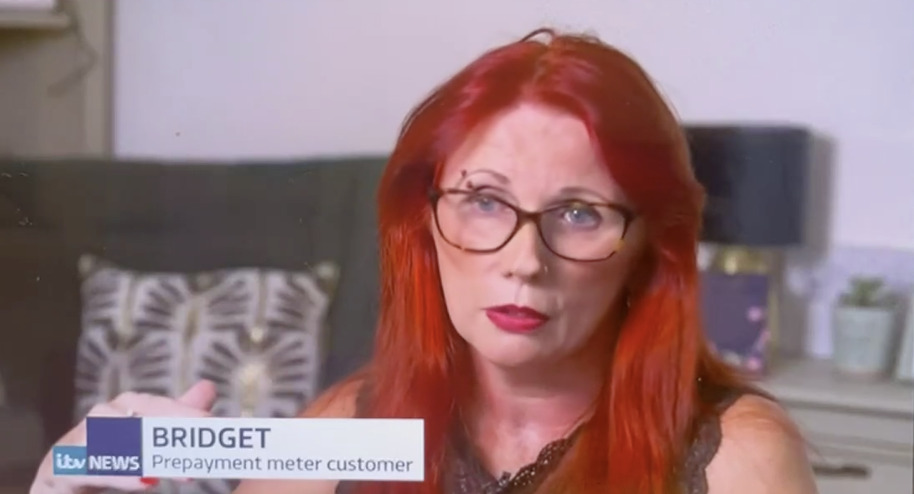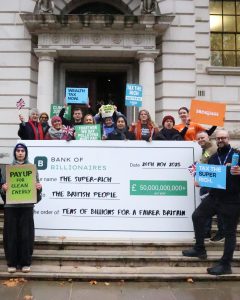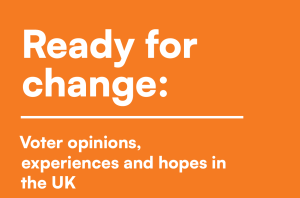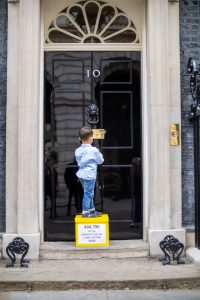

Sep 1st, 2023
Energy debt scandal revealed – thanks to 38 Degrees supporters
By 38 Degrees team
People paying for their energy through prepayment meters are being weighed down by a huge and rising burden of debt – which many may never pay off. That’s according to new Ofgem numbers uncovered by 38 Degrees this week, and highlighted on ITV Evening News.
The research, and the campaigning work to get the facts on the political agenda, was paid for by hundreds of 38 Degrees supporters who chipped in an average of £7.82.
The Ofgem figures, which we obtained by Freedom of Information requests, show a total of £1,026,223,558 in debt sitting on prepayment meters in the first quarter of 2023. Energy debt repayments are deducted from the credit on prepayment meters, meaning the worst-off customers can watch the money they put on their meters get ‘eaten up’ by debt. This may even leave them cut off and unable to power or heat their homes after topping up.
People fall into debt in two ways: by being switched onto prepayment with existing debts left to pay off, or because they’re already on a prepayment meter and have asked for emergency credit they must then pay back.
Being switched onto a prepayment meter
Mum-of-three Melissa Perren, 42, who lives near Plymouth, always paid her rent ‘religiously’ and was never behind on rent payments. But as a full-time carer for two disabled children, when the energy crisis hit, she struggled to pay energy bills of as much as £1,200 a month, racking up debt which was then transferred to a prepayment meter. Whilst suppliers have to work with customers who tell them they are struggling to pay off debts to come up with repayment plans, for families like Melissa’s even these plans can mean the last of their available cash being put towards debt.
“At one point we were having to pay £10 a week off on the debt – I would put £10 on the meter and it would disappear onto the debt straightaway, leaving us with no credit. I couldn’t afford to have the electricity on, I couldn’t keep the house warm – but I still had to put money on the meter that we couldn’t use for power. It’s fair enough that you have to pay what you owe, but in our situation it felt like we could never pay it off. We were self-disconnecting almost every day, we’d be left without power overnight. Two of my children are disabled and it’s bad for their health – last winter, my son ended up in hospital because his asthma got so bad with how cold and damp it was. People shouldn’t have to live like that.”
Melissa
Asking for emergency credit whilst already on a prepayment meter
Bridget Chapman, 53, is a mental health therapist from Darlington. Bridget sees therapy clients from her home and needs to welcome them with a warm, well-lit environment, but with her clients struggling to afford regular therapy she has had to cut her own prices and has begun finding it hard to keep her meter topped up.
She recently had to ask for emergency credit for the first time, racking up a debt which she’ll now have to pay off. She has agreed to repay £3 a week with her supplier. Bridget says that, whilst that may not sound like much to some people, for someone who was already struggling to keep the meter topped up, it’s an extra cost she can hardly afford.
“I had to ask for help. It was the first time I turned to the energy company to ask for help and now, every week, I have to put money onto the meter which goes straight onto the debt. As a mental health professional, I do have tools to manage my anxiety, but I know the emotional impact and stress a debt like this can have on many people. It’s totally unfair that these energy companies can make such huge profits but can’t help people who’ve turned to them for support in an emergency.”
Bridget
The figures – which show the prepayment debt burden has more than tripled, from £328m in 2019 – come as Ofgem recently consulted on rules which could allow the forced fitting of prepayment meters to restart. It’s clear that force fitting, which caused a scandal earlier in the year, is not the only problem in the prepayment energy market.
We wanted to get these scandalous stats out there to pile even more pressure on Ofgem – and to do it, we worked with partners Debt Justice and End Fuel Poverty Coalition. Debt Justice’s Executive Director Heidi Chow told us, “Energy debt is devastating for millions of households who can no longer afford to cook meals, keep the lights on or operate medical equipment. With winter fast approaching the Government needs to get its head out of the sand and set up a Help to Repay scheme to tackle unpayable debt in a fair way.”
More than 45,000 people have signed a 38 Degrees petition calling on the Government to help families with the burden of energy debt before winter and introduce a social tariff, so the most vulnerable people pay less for their energy.
Add your name to demand action here.

















